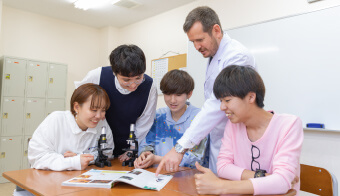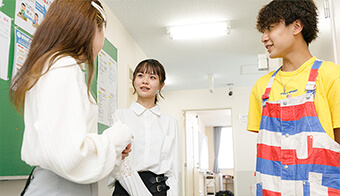ブログ
2016.02.02
英語スピーチコンテストを終えて 2016
相変わらず聞く者を惹き付けてやまないMr. Burgessの軽妙な司会進行のもと、今年度もKIHSスピーチコンテストが行われました。
審査員の多くが外国人教員
本校の英語スピーチコンテストは、外国人教員も多数指導に加わるインターナショナルスクールならではのコンテストで、今年度は8名の外国人教員が審査員を務めました。日本人英語科教員も審査員を務め、会場にはアットフォームな雰囲気の中にも本選独特の緊張感が漂っていました。
例年より早い実施日
今年度のコンテスト開催日は、例年よりもやや早まって1月29日となりました。
そのため、出場した14名の参加者はレベル代表選出から本選まであまり日がなく、限られた準備期間の中、最大限の努力を以てコンテストに臨みました。
コンテスト当日までの準備
1~3年生までの全校生徒が、後期中間試験終了後、12月初旬から当日に至るまで冬休み期間も含めて、このコンテストに向けて準備を進めていきました。
各レベルの担当教員による指導の下、何度も原稿を推敲し、授業内で発表しあうという経験は、代表に選ばれなかった生徒にとっても間違いなく貴重な学習となっています。
出場者数に限りがあり、残念ながら選出は出来なかったものの、全校生徒の前で披露して欲しいと思われたスピーチも1つや2つではありません。
そのような中から選ばれた代表者の発表は、いずれも素晴らしいものでした。
コンテスト本番では
コンテンツはもちろんのこと、アイコンタクトやジェスチャーなど、聴衆にいかに訴えかけるかを工夫して、例年以上に質の高い発表が行われました。
中には緊張でこわばる発表者もありましたが、友人を応援するオーディエンスの視線は暖かく、KIHSならではのホーミーな空気を、教員として大変嬉しく感じました。

最終的に、生徒の投票得点とネイティブ教員、日本人教員計12名の審査員による投票得点を基に協議を重ね、1~3位のスピーチを選びましたが、案の定、絞りきることが難しく、急遽3位入賞者を2名に増やすこととなりました。
それでもなお、他にも賞を与えたいスピーチがあり、コンテストが回を重ねる毎に、私たち審査員の悩みは深まるばかりです…
英語科主任 興野 美穂
優勝した榎本安純のスピーチ
以下は今回優勝した2年生榎本安純のスピーチ原稿です。
スピーチのタイトル: Customary differences
Customary differences
How many times do you say, “I’m sorry” in a day? In Japan, we use this word very often, when we make a little mistake, even when we are not to blame, and also we use it when thanking someone, too. However, when we Japanese are seen in point of view of foreigners, this habit seems to be very weird. Foreign people often think it strange that Japanese use the word all the time, because they don’t use it so often.
In this way, your habit or custom in this country may seem strange and thoughtless in the world. Since you are studying English in this school, you had better know the differences between our “customs” to make it easier to understand each other.
First, let’s talk about body language. For example, you often make a peace sign reversely and take pictures. This pose is popular in Japan because if you put it around your chin, your face looks smaller. But in foreign countries such as England or Australia, this pose has very insulting meaning. If you do this in front of people in these countries, they would be surprised or shocked. Another example is this. You put your open palm beside your face
as a meaning of “stop!” But in Greece, this means, “you are stupid.”
Are you surprised? Body language can help communicating, but also disturb it.
These cultural differences are shown not only in body languages but also in food manners. Slurping noodles is only accepted in Japan, and many other countries think it vulgar. English people especially hate it. When you eat noodles with foreign people, you’d better eat silently. There are more examples. When you eat hot soup, you often blow on the soup and make it cooler and easier to eat. But this blowing is bad behavior. Foreign people usually wait for a few minutes or use the back of their spoon and cool it.
Furthermore, in China or Korea, you should not eat all of your meal. When you eat it all, this means, “It’s not enough for me. I want to eat more. Your service is not good.” So you should leave some food to show the meal you had was great and thank the restaurant for its hospitality.
I have explained some examples of taboos in other countries. You may have thought them strange or couldn’t understand why they are bad. But our country, Japan, also has behaviors that seem to be bad but other countries think them natural. For example, you should be quiet in public places such as on the train or the bus and you shouldn’t eat or drink in such places. Of course you know it is bad manners, but it is natural in foreign countries. Speaking about public places, it’s better for you to give your seats to the elderly, the pregnant, or someone who looks sick. This custom is very different from other countries’, and acclaimed by those countries. Also, Japanese people don’t like getting so emotional. So, many people in Japan don’t shout or use offensive language in a loud voice. In Japan, people think they should not stand out. This rule connects to the Japanese silence in public places, too. For foreign people, Japanese habits are strange and novel, but they think them magnificent habits. One American person who knew the Japanese taboos said, “These Japanese habits show how Japanese people are vigilant for their surroundings and other people.” And another American person said, “The more I know about Japan, the more I love the small country. These habits are all reasonable. ”
From these things, Japanese habits seem strange to people in other countries, and we have the same feeling toward foreign customs, too. But our customs are one of the most important things that we have to save. Our differences of habits are made by differences of cultures. You should treasure your culture, and your habits as well. Every country in the world has its own culture and own rules and people follow them unknowingly. This is the reason why when you see someone with bad behavior, you feel disgusted.
In this school, you study English and how to communicate with each other in foreign countries in foreign languages. You may be studying English because you want to work abroad or live in other countries someday.
However, language is not the only way to communicate with people abroad.
Your behavior may be more important rather than languages in term of communicating because it’s easier to judge people’s characters by checking how they behave than how they speak. So, if you want to go to other countries, the first thing you have to do is to know about the countries’ culture, and habits. And the next thing you have to do is to try to follow them when you are in these countries. If you want to get along with someone abroad, your manner plays a very important role.
As the proverb says, “When in Rome, do as the Romans do.”

↓本校HPはこちら

大阪のインターナショナルスクールなら
関西インターナショナルハイスクール
〒545-00053 大阪市阿倍野区松崎町2-9-36
帰国生・帰国子女受け入れ校
高校卒業資格(向陽台高等学校との併修制度による。ただし2016年度からはNHK学園高等学校に変更します)
タグ一覧
- AIG高校生外交官プログラム
- APU
- Australia
- BA.5
- BBQ
- Bournemouth
- CAE
- CEFR
- class
- English
- estar動詞
- FCE
- George Bernard Shaw
- graduation ceremony
- GTEC
- GUP
- Halloween
- HOMESTAY
- HSDJapan
- IELTS
- LESSON
- Listening
- Manual Rios
- MOJO
- MUN
- MySOS
- NISA
- OECD
- PCR検査
- SDGs
- Semana Santa
- ser動詞
- SNS
- Society3.0
- Society4.0
- Society5.0
- Speaking
- Speech Contest
- TCK
- Third Culture Kid
- TOEIC
- USJ
- VRoid
- WFPチャリティーエッセイコンテスト
- WFP賞
- World History
- アイデンティティ
- アジア学院
- アバター
- アルゼンチン
- イカゲーム
- イギリス
- イクサガミ
- インタビュー
- インテックス大阪
- エディオンアリーナ大阪
- オーストラリア
- オーストラリア入国
- オーストラリア出国
- おおさかグローバル塾
- お笑い文化
- お金の勉強
- キューズモール
- クイズ大会
- グラバー園
- クリスマス
- グローバル
- グローバルスタディーズ
- グローバル化
- ケンブリッジ英検
- コミュニケーション力
- ごみ問題
- コロナ
- コロナ禍
- コンテスト
- サーフィン
- サッカーコーチ
- シーカヤック
- ジェンダー
- シドニー
- スキー
- スキー研修
- スクーリング
- ストーリーテリング・コンテスト
- ストレス
- スノボ
- スピーチコンテスト
- スペイン語
- スポーツ大会
- セレッソ大阪
- ソーシャルメディア研究会
- ダンス
- ダンスレッスン
- チュニジア
- デジタル
- ドイツ
- ドッジボール
- トラウマ
- バイロンベイ
- ハウステンボス
- ハロウィン
- パンフレット
- ピクトグラム
- フードロス問題
- フィールドスタディ
- フィンランド
- プレゼンテーション
- ペンギン水族館
- ホームステイ
- ホームルーム
- ボーンマス
- ホストファミリー
- ボランティア
- ボランティアサークル
- ボランティア参加
- マネーリテラシー
- マレーシア
- ランナー
- リーズ大学
- リーダー
- リレー
- ワークショップ
- 一般入試
- 世界史
- 世界経済フォーラム
- 中間試験
- 乗馬
- 九十九島
- 交流会
- 京都外国語大学
- 京都大学
- 今村翔吾
- 他者認識
- 体育
- 体育大会
- 併修
- 併修校
- 使える英語
- 保健室
- 先生の言いたいこと
- 先生紹介
- 入国制限
- 入学式
- 八本目の槍
- 公募制推薦入試
- 出張授業
- 分野別説明会
- 副学長
- 動物園
- 医療
- 卒業式
- 卒業生
- 南海トラフ大地震
- 台湾
- 台湾の大学
- 台湾留学
- 合格実績
- 合格状況
- 同志社大学
- 図書委員
- 国際協力
- 国際学部
- 国際理解
- 在日米国大使館助成プログラム
- 地震
- 城
- 塞王の楯
- 外国語
- 多国籍
- 大学
- 大宰府天満宮
- 大浦天主堂
- 大阪マラソン
- 大阪万博
- 大阪府知事賞
- 大阪府立体育館
- 太宰府天満宮
- 学校生活
- 学校給食支援
- 学習
- 安藤百福名誉博士奨励賞
- 定期試験
- 就職
- 就職内定
- 岸田首相
- 帰国生
- 心理学
- 志賀高原
- 思春期セミナー
- 投資信託
- 授業
- 授業参観
- 推薦入試
- 損害賠償金
- 文学
- 文科省
- 新入生交流会
- 新学期
- 新年度
- 旅行・観光開発ランキング
- 日本グローバル教育学会
- 期末試験
- 未来構想キャンプ
- 株式投資
- 桜花学園大学
- 模擬国連
- 模擬国連大会
- 模擬国連大阪
- 歯科衛生士
- 水危機
- 水族館
- 法律
- 海外
- 海外の大学
- 海外大学受験講座
- 海外留学
- 海外研修
- 渡航
- 災害
- 特別講師
- 玉入れ
- 環境問題
- 生きがい
- 生きた英語
- 生徒会
- 留学
- 直木賞
- 短期留学
- 石垣
- 石田三成
- 研修
- 研修会
- 研修旅行
- 社会貢献
- 神奈川歯科大学
- 稲佐山
- 立命館アジア太平洋大学
- 竹内義博
- 第七波
- 綱引き
- 総合型推薦入試
- 総合型選抜入試
- 緩和
- 美術
- 翻訳
- 自己理解
- 自己認識
- 自習
- 芸術鑑賞
- 英検
- 英語
- 英語レベル分け試験
- 英語教員
- 英語教育
- 英語教育実施状況調査
- 褒めニケーション
- 試験
- 語学学校
- 語学研修
- 課外活動
- 講演
- 講演会
- 賤ヶ岳の七本槍
- 通訳
- 進学
- 進路
- 進路指導
- 進路説明会
- 道程
- 選択必修科目
- 長崎
- 長野県
- 関西外語専門学校
- 防災研修
- 防犯防災総合展2022
- 阿倍野
- 陰性証明
- 集中科目
- 風頭公園
- 飛田匡介
- 食品ロス問題
- 高村幸太郎
- 高校
- 高校生ボランティアアワード
- 高校生支援
- 龍谷大学





